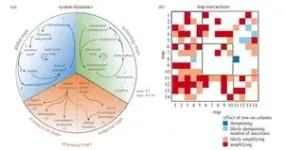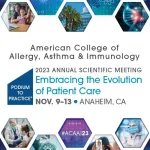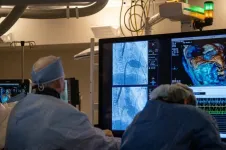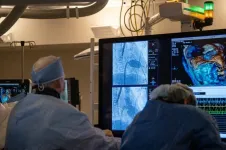(Press-News.org) For the first time, scientists have used the concept of evolutionary traps on human societies at large. They find that humankind risks getting stuck in 14 evolutionary dead ends, ranging from global climate tipping points to misaligned artificial intelligence, chemical pollution, and accelerating infectious diseases.
The evolution of humankind has been an extraordinary success story. But the Anthropocene — the proposed geological epoch shaped by us humans — is showing more and more cracks. Multiple global crises, such as the Covid-19 pandemic, climate change, food insecurity, financial crises, and conflicts have started to occur simultaneously in something which scientists refer to as a polycrisis.
“Humans are incredibly creative as a species. We are able to innovate and adapt to many circumstances and can cooperate on surprisingly large scales. But these capabilities turn out to have unintentional consequences. Simply speaking, you could say that the human species has been too successful and, in some ways, too smart for its own future good,” says Peter Søgaard Jørgensen, researcher at the Stockholm Resilience Centre at Stockholm University and at the Royal Swedish Academy of Sciences’ Global Economic Dynamics and the Biosphere programme and Anthropocene laboratory.
He is the lead author of a new landmark study published today as part of a larger assessment in the journal Philosophical Transactions of the Royal Society B. The assessment gathers insights from a wide range of different scientific disciplines across the natural and social sciences and humanities, to understand how the Anthropocene evolved and how global sustainability can continue to evolve in the future.
The new study shows how humanity could get stuck in “evolutionary traps” — dead ends that occur from initially successful innovations. In a first scoping effort, they identify 14 of these, including the simplification of agriculture, economic growth that does not deliver benefits for humans or the environment, the instability of global cooperation, climate tipping points, and artificial intelligence (for a full list of traps see table further down).
“Evolutionary traps are a well-known concept in the animal world. Just like many insects are attracted by light, an evolutionary reflex that can get them killed in the modern world, humankind is at risk of responding to new phenomena in harmful ways,” explains Peter Søgaard Jørgensen.
The simplification of agricultural systems is an example of such a trap. Relying on a few highly productive crops such as wheat, rice, maize, and soya, has meant that calories produced have skyrocketed over the past century. But it also meant that the food system has become very vulnerable to environmental change, such as weather extremes, or new diseases.
Of the 14 evolutionary traps, 12 are in an advanced state, meaning that humankind is on the verge of getting stuck to a degree where it becomes very difficult to get out. What’s more, societies are continuing to move in the wrong direction in 10 of these 14. Alarmingly, these evolutionary traps tend to reinforce each other. If societies get stuck in one dead end, they are more likely to get stuck in others as well. The two dead ends which currently are less advanced are the autonomy of technology – AI and robotics – and a loss of social capital through digitalization.
The new assessment also looks into why societies struggle so hard to move out of these traps.
“The evolutionary forces that created the Anthropocene do not work well at the global level. In today’s global systems, social and environmental problems grow in places that seem distant to the societies that could prevent them. Also, addressing them often requires global collaboration on a scale that many evolutionary forces often do not align well with,” says co-author Lan Wang-Erlandsson, researcher at the Stockholm Resilience Centre at Stockholm University and the Royal Swedish Academy of Sciences’ Anthropocene laboratory.
This does not mean that humanity is doomed to fail, argue the researchers. But we must start to transform our societies actively. So far, the Anthropocene has to a large extent been an unconscious byproduct of other evolutionary processes.
“It’s time for humans to become aware of the new reality and to collectively move where we want to as a species. We have the capability to do that and are already seeing signs of such movements. Our creativity, and our power to innovate and collaborate equip us with the perfect tools to actively design our future. We can break out of dead ends and business-as-usual, but for that, we must nurture the capacity for collective human agency and design settings where it can flourish,” explains Peter Søgaard Jørgensen.
He continues: “A very simple thing that everybody can do is to engage more in nature and society while also learning about both the positive and negative global consequences of our own local actions. There’s nothing better than exposing yourself to what needs protecting.”
END
New research maps 14 potential evolutionary dead ends for humanity and ways to avoid them
Misaligned AI is not the one you should worry most about (yet)
2023-11-13
ELSE PRESS RELEASES FROM THIS DATE:
Lepodisiran, an extended-duration short interfering RNA targeting lipoprotein(a)
2023-11-12
About The Study: In this phase 1 study of 48 participants with elevated lipoprotein(a) levels, lepodisiran was well tolerated and produced dose-dependent, long-duration reductions in serum lipoprotein(a) concentrations. The findings support further study of lepodisiran, which is a short interfering RNA directed at hepatic synthesis of apolipoprotein(a), an essential component necessary for assembly of lipoprotein(a) particles.
Authors: Steven E. Nissen, M.D., of the Cleveland Clinic Center for Clinical Research in Cleveland, is the ...
Trial shows a single dose of an experimental therapy reduces lipoprotein(a), an important heart disease risk factor, more than 94% for nearly a year
2023-11-12
Cleveland: Findings from a phase 1 trial reported by a Cleveland Clinic physician show that a single dose of an experimental therapy produced greater than 94% reductions in blood levels of lipoprotein(a), a key driver of heart disease risk, with the results lasting for nearly a year.
Results from the “Efficacy and Safety of Lepodisiran: An Extended Duration Short-Interfering RNA Targeting Lipoprotein(a) Study” were presented today during a late-breaking science session at the American Heart ...
Gailen Marshall installed as ACAAI President
2023-11-12
ANAHEIM, Calif. (November 12, 2023) – Allergist Gailen Marshall, MD, PhD, of Jackson, MS, was installed as president of the American College of Allergy, Asthma and Immunology (ACAAI) at the ACAAI Annual Scientific Meeting on November 12 in Anaheim, Calif. Allergist James Tracy, DO, of Omaha, NE, was elected ACAAI president-elect.
Other newly elected ACAAI officers are Cherie Zachary, MD, Eagan, MN as vice president and Kelly Maples, MD, Norfolk, VA as treasurer. Regents elected for three-year terms include Aikaterini Anagnostou, MD, MSc, PhD, Houston, Texas, Brian T. Kelly, MD, MA, Omaha, Nebraska and Mervat Nassef, MD, New York, New ...
Decline in estimated glomerular filtration rate after dapagliflozin in heart failure with mildly reduced or preserved ejection fraction
2023-11-12
About The Study: Among patients with heart failure with mildly reduced ejection fraction or heart failure with preserved ejection fraction treated with dapagliflozin in this randomized clinical trial, an initial estimated glomerular filtration rate (eGFR) decline was frequent but not associated with subsequent risk of cardiovascular or kidney events. These data reinforce clinical guidance that sodium-glucose cotransporter-2 inhibitors should not be interrupted or discontinued in response to an initial eGFR decline.
Authors: Finnian R. Mc Causland, ...
2023 Joseph A. Johnson Award goes to Yale University professor of physics
2023-11-12
AIP and the National Society of Black Physicists congratulate Charles D. Brown II as the winner of the 2023 Joseph A. Johnson Award for Excellence. Dante O’Hara and Danielle Speller are also being recognized with Honorable Mentions.
The Johnson Award, now in its fourth year, is given by AIP and NSBP to recognize early-career scientists who demonstrate scientific ingenuity and impactful mentorship and service – the core values of NSBP founder Joseph A. Johnson.
“We are excited to recognize Dr. Brown’s impact on the physics community,” said Michael Moloney, CEO of AIP. ...
A high-risk antiphospholipid antibody profile matters in pediatric patients with antiphospholipid syndrome
2023-11-12
San Diego, CA, November 12, 2023 - A new study by Hospital for Special Surgery (HSS) investigators has found that an initial high-risk antibody profile for antiphospholipid syndrome (APS) tended to remain high in pediatric patients. The results were presented today in a poster session at American College of Rheumatology (ACR) Convergence 2023, the ACR’s annual meeting.1
“There are a lot of unanswered questions about how APS affects pediatric patients since evidence to date has been very limited,” said Jheel Pandya, MD, a pediatric rheumatology fellow at HSS and lead author of the research. “Our study reveals that an initial high-risk ...
Hormonal contraceptives in teens may alter risk assessment
2023-11-12
[Embargoed until 1 p.m. (ET) Sunday, Nov. 12]
WASHINGTON – Hormonal contraceptives taken by adolescents may influence development of the brain in a way that alters the recognition of risks, a new study in rats suggests.
Scientists at The Ohio State University are exploring how common synthetic hormones used for birth control affect the prefrontal cortex, an area of the brain that continues to develop throughout adolescence.
The researchers found that myelination, the formation of protective coating on axons projecting from the main body of brain cells, increased in rats given hormonal birth control compared to untreated rats, while the number ...
Early-life stress changes more genes in brain than a head injury
2023-11-12
WASHINGTON – A surprising thing happened when researchers began exploring whether early-life stress compounds the effects of a childhood head injury on health and behavior later in life: In an animal study, stress changed the activation level of many more genes in the brain than were changed by a bump to the head.
It’s already known that head injuries are common in young kids, especially from falling, and can be linked to mood disorders and social difficulties that emerge later in life. Adverse childhood experiences are also very ...
Summer wildfire and winter air pollution and particulates linked to different risks of heart attack and severe chest pain, new study finds
2023-11-12
Short-term increases in air pollution can cause problems for a lot of people, but especially to those with diagnosed or undiagnosed heart disease. But it’s not just a potential issue for pollution coming from cars and industrial processes.
New research from Intermountain Health in Salt Lake City shows that pollutants trapped in lower, colder layers of air in mountain-region communities present sometimes higher risk for this population, while wildfire smoke from often distant locales may also impact risk.
“We’re finding that air pollution is affecting ...
New study finds current dosing recommendations may not help patients achieve optimal vitamin D levels
2023-11-12
Low levels of Vitamin D have been shown to be associated with a higher risk of having a cardiac event, like a heart attack or stroke. For this reason, treatment by Vitamin D pills or injections are being investigated as a possible preventative method in these patients.
However, two new studies from Intermountain Health in Salt Lake City have found that current dosing recommendations are not helping patients achieve optimal Vitamin D levels, suggesting that trials looking into the effectiveness of Vitamin D treatment to prevent cardiac events were not using appropriately sufficient doses, leading to inaccurate results.
In their studies, Intermountain ...
LAST 30 PRESS RELEASES:
ASU researchers to lead AAAS panel on water insecurity in the United States
ASU professor Anne Stone to present at AAAS Conference in Phoenix on ancient origins of modern disease
Proposals for exploring viruses and skin as the next experimental quantum frontiers share US$30,000 science award
ASU researchers showcase scalable tech solutions for older adults living alone with cognitive decline at AAAS 2026
Scientists identify smooth regional trends in fruit fly survival strategies
Antipathy toward snakes? Your parents likely talked you into that at an early age
Sylvester Cancer Tip Sheet for Feb. 2026
Online exposure to medical misinformation concentrated among older adults
Telehealth improves access to genetic services for adult survivors of childhood cancers
Outdated mortality benchmarks risk missing early signs of famine and delay recognizing mass starvation
Newly discovered bacterium converts carbon dioxide into chemicals using electricity
Flipping and reversing mini-proteins could improve disease treatment
Scientists reveal major hidden source of atmospheric nitrogen pollution in fragile lake basin
Biochar emerges as a powerful tool for soil carbon neutrality and climate mitigation
Tiny cell messengers show big promise for safer protein and gene delivery
AMS releases statement regarding the decision to rescind EPA’s 2009 Endangerment Finding
Parents’ alcohol and drug use influences their children’s consumption, research shows
Modular assembly of chiral nitrogen-bridged rings achieved by palladium-catalyzed diastereoselective and enantioselective cascade cyclization reactions
Promoting civic engagement
AMS Science Preview: Hurricane slowdown, school snow days
Deforestation in the Amazon raises the surface temperature by 3 °C during the dry season
Model more accurately maps the impact of frost on corn crops
How did humans develop sharp vision? Lab-grown retinas show likely answer
Sour grapes? Taste, experience of sour foods depends on individual consumer
At AAAS, professor Krystal Tsosie argues the future of science must be Indigenous-led
From the lab to the living room: Decoding Parkinson’s patients movements in the real world
Research advances in porous materials, as highlighted in the 2025 Nobel Prize in Chemistry
Sally C. Morton, executive vice president of ASU Knowledge Enterprise, presents a bold and practical framework for moving research from discovery to real-world impact
Biochemical parameters in patients with diabetic nephropathy versus individuals with diabetes alone, non-diabetic nephropathy, and healthy controls
Muscular strength and mortality in women ages 63 to 99
[Press-News.org] New research maps 14 potential evolutionary dead ends for humanity and ways to avoid themMisaligned AI is not the one you should worry most about (yet)






